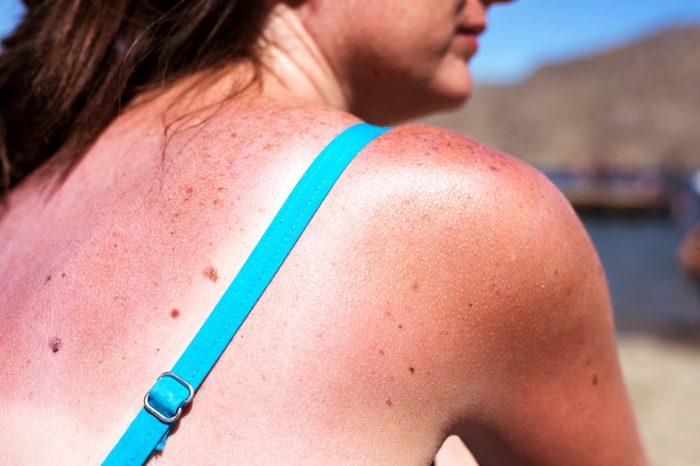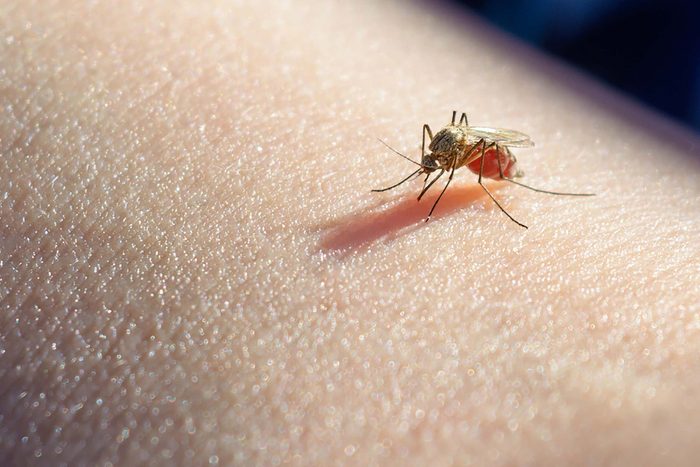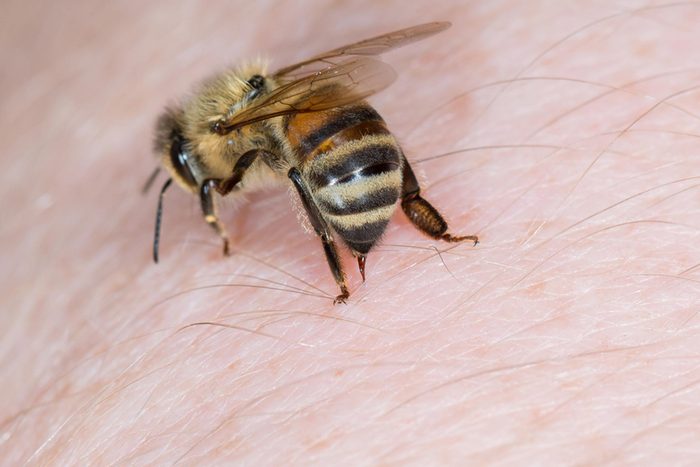
Summer health mistakes
Summertime could be a great opportunity to eat healthier, with a greater variety of seasonal produce, and get some fresh air and movement. But there are also risks and mistakes that could make summer not-so-healthy. Here’s how to avoid those sneaky ways summer could make you sick.
Sunburn
You probably know that the summer sun puts you at a greater risk of painful sunburns, but you might not realize the long-term effects and damage of just one sunburn. “Sunburns put you at risk of premature aging of the skin as well as life-threatening skin cancers,” says Thomas Morland, MD, an internal medicine physician at Geisinger, a regional healthcare provider. The best way to prevent these outcomes is to reduce intense, direct sunlight and to wear a sunscreen with an SPF of 30 or higher whenever you leave the house. “Be sure to bring an umbrella to the beach and wear protective clothing like hats, sunglasses, and lightweight clothes when possible,” he says. “Also, try to schedule outdoor activities in the morning or late afternoon instead of when the sun is right overhead.” (Here’s how to relieve a sunburn naturally.)
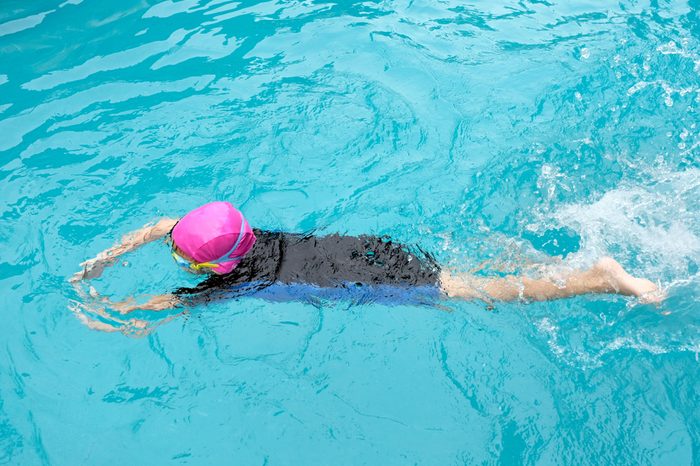
Drowning
Most of us imagine a deep pool or ocean when we think of a place where someone might drown, but it could happen anywhere—even in a bathtub—and to anyone. Over 400 Canadians drown each year, and most of drownings occur in children under the age of 14. “Constant supervision of all children while swimming is a must,” says Dawne Kort, MD, attending physician at CityMD. “Appropriate child-proof barriers such as gates around pools or ponds, locks, and alarms can also reduce drowning.” And, though rare, some drownings occur after a person has left the pool. (Check out the latest pool safety tips you need to know.)
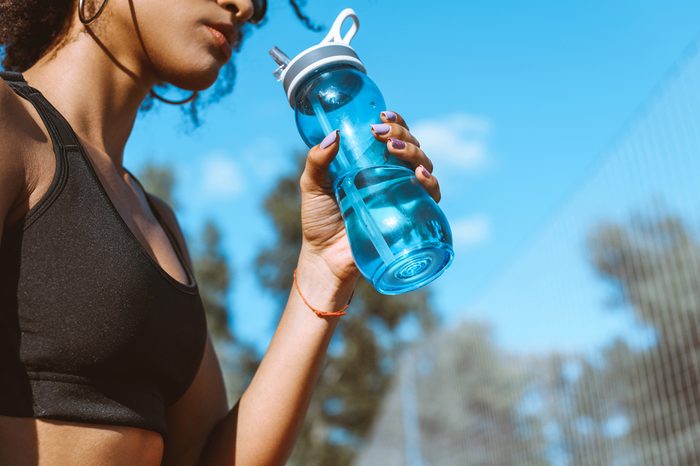
Dehydration
As you sweat more in the summer heat, you have to be extra diligent about staying hydrated. In addition to replacing lost fluids, you’ll also want to replace lost electrolytes. If you’re going to be really active on a hot day, Dr. Morland suggests drinking a sports drink, which will give you electrolytes in addition to water. “Keep in mind for people with heart, lung, kidney, or liver conditions, the picture is more complicated,” he says. If you fall into one of these categories, discuss your hydration needs with your primary care physician to ensure you’re getting what you need. (Here are the signs you’re dehydrated.)
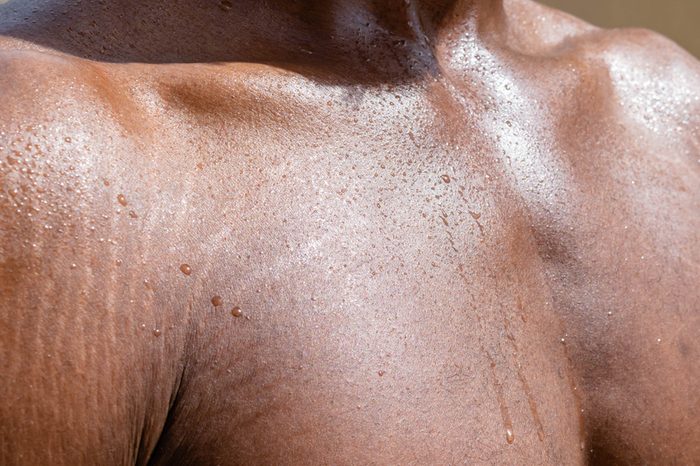
Heat exhaustion
Even when you’re wearing sunscreen, overexposure to the sun can leave you susceptible to heat exhaustion, especially if you’re low on fluids. “Symptoms include dizziness, increased sweating, increased heart rate, muscle cramps, nausea/vomiting, confusion, flushed skin, headaches, and even shortness of breath,” says Dr. Kort. “Avoid trouble by staying hydrated, reducing outdoor exposure (especially during the hottest times of the day), wearing light clothing that allows heat to escape, and taking frequent breaks.”
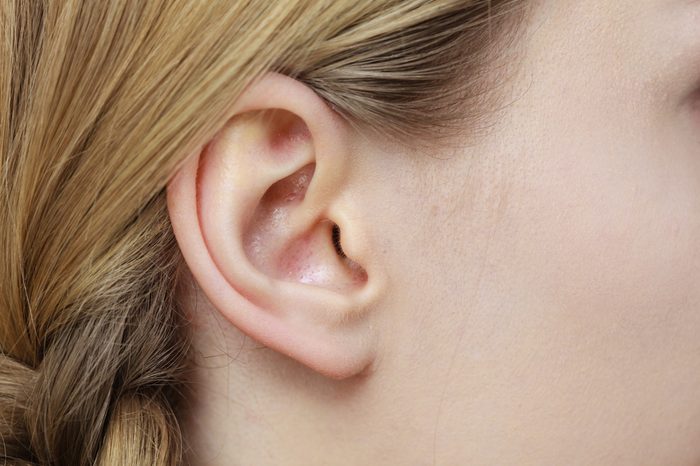
Swimmer’s ear
This infection, also known as otitis externa, occurs when water gets trapped in the ear canal and the moist environment encourages bacteria to grow. It’s often the result of frequent or daily swimming, showering, and participating in water sports, explains Dr. Kort. “Each of these activities can leave the ears susceptible to trapped water in the ear canal, causing it to become swollen, irritated.” To help ease the pain and discomfort, she recommends antibiotic drops, which can be prescribed by your physician, keeping the ear canal dry, and avoiding more water related-activity until the infection clears.
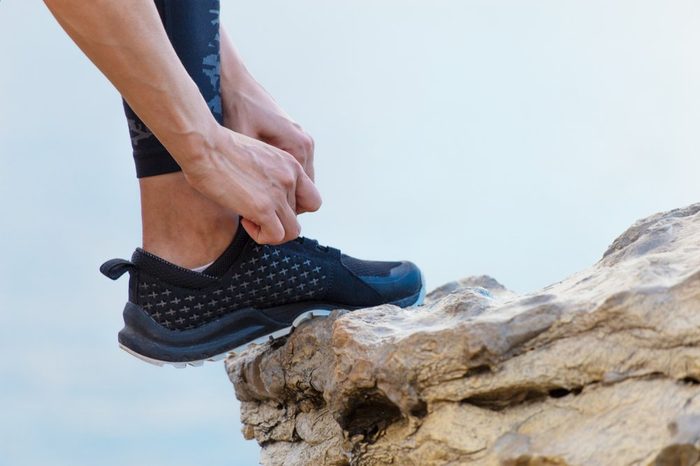
Athlete’s foot
Hot, humid weather takes a toll on your skin—especially your feet. “When sweat becomes trapped between your toes in hot weather, it creates an environment that encourages fungus to grow, which increases your risk of developing athletes foot,” says Joshua Zeichner, MD, director of cosmetic and clinical research in the department of dermatology at The Mount Sinai Hospital in New York City. “The good news is that it easily can be treated using over-the-counter Lotrimin cream.” If you notice that the skin between your toes looks white and develops cracking, he recommends applying the antifungal cream right away and continuing to do so twice daily. Or, check out these natural home remedies for athlete’s foot.
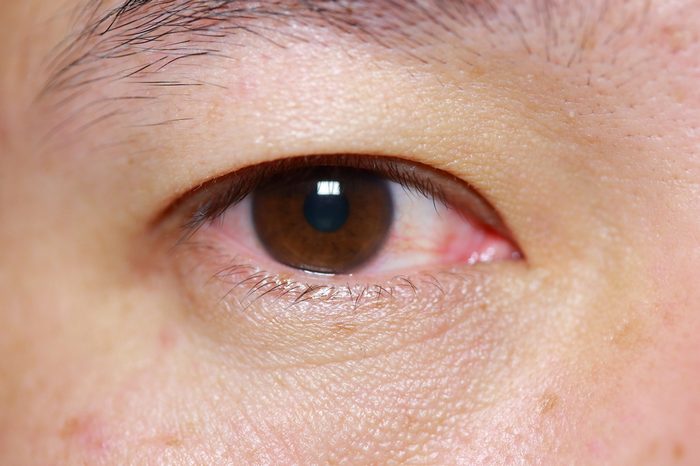
Pink eye
While this eye infection—officially called conjunctivitis—can happen any time of year, you’re more susceptible in the summertime when your eyes tend to be drier. “Dry eyes increase the risk of conjunctivitis, which is manifested through the inflammation and redness of the whites of the eyes,” explains Lisa Ashe, DO, an internal medicine physician in Washington, D.C. Conjunctivitis can be caused by a viral infection, bacteria, or allergies, she says. If it’s an infection, it can easily spread from person to person by touching the eyes or eye secretions of the contaminated, then touching your own eyes, warns Dr. Ashe.
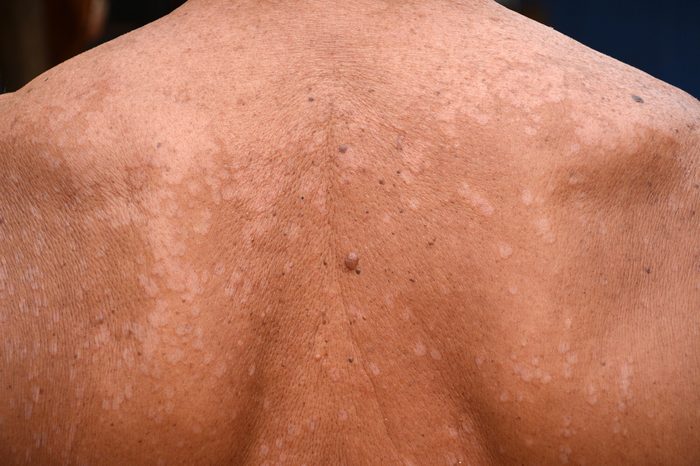
Tinea versicolor
This red, scaly rash is a common occurrence in the summer when sweat and oil build up on areas of the body, mainly the chest and back, which is where the rash typically spreads. It can often appear with white spots and is caused by high levels of yeast growing on the skin. “An easy fix for tinea versicolor is to use an effective dandruff shampoo, like Dove Dermacare Scalp Clean & Fresh Anti-Dandruff Shampoo, as a liquid cleanser for your body,” says Dr. Zeichner. “It contains an ingredient called zinc pyrithione which lowers levels of yeast on the skin.” He recommends applying it to the chest and back for several minutes before washing it off; use it daily while you have the rash.

Food poisoning
While summer calls for outdoor grilling and entertaining friends, the heat and humidity create a perfect breeding ground for bacteria. “Poorly cooked meats and food left outside in the heat for prolonged periods of time increase the risk for foodborne illnesses such as salmonella, shigella, campylobacter, and E. coli,” says Dr. Kort. The best way to avoid foodborne illness is to make sure meats are cooked properly and thoroughly and not allow food to sit in direct sun and heat for prolonged periods of time. “Proper handwashing and proper washing of foods before serving and preparing also reduces these bacteria,” adds Dr. Kort. “Make sure to frequently, and properly, clean cooking surfaces with antibacterial soaps and cleaners.” Here are the food that could give you food poisoning this summer.
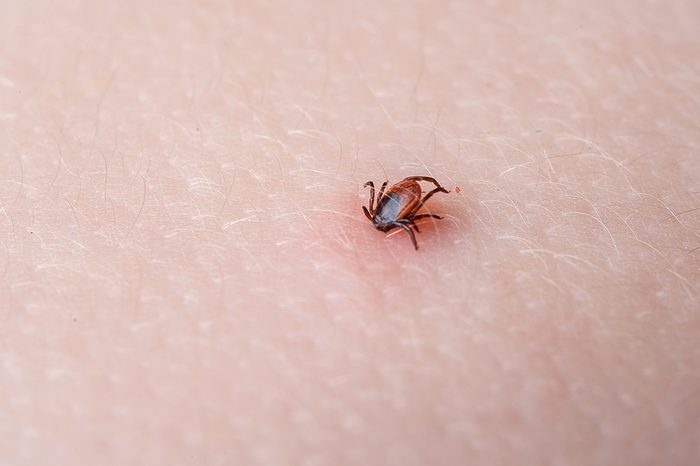
Tick-borne diseases
Tick-borne illnesses such as Lyme, Rocky Mountain spotted fever, babesiosis, ehrlichiosis, and anaplasmosis are more prevalent in summer months because of the warm weather and frequent outdoor activity, according to Dr. Kort. “When the temperature goes up, ticks become more active—plus, we tend to spend far more time outdoors during these months than during the winter.” Ticks thrive in humid environments, as they absorb their water intake through the air. To limit possible tick exposure, Dr. Kort recommends wearing protective clothing, such as long sleeves, long pants, and hats whenever outdoors, especially in wooded areas. Also, get into the habit of checking yourself for ticks each time you’ve been outside—daily is best. “They’re small and can be hard to spot if you’re not actively looking for them,” he says. Learn about the scary treatment of lyme disease and other tick-borne illnesses.
Mosquito-transmitted infections
Mosquito bites are annoying, but they can leave more than just an itchy bump. “While serious cases of mosquito-borne illness are less common in the United States than the rest of the world, we do see things like West Nile virus during the summer and fall,” says Dr. Morland. “Public health officials are also worried about the potential for increases in previously uncommon viruses like dengue and Zika virus in parts of the country.” Protect yourself from mosquito bites by wearing long sleeves and pants in the evening when mosquitoes are most active and applying DEET-containing sprays and creams. (Also, here are the signs you could have a mosquito bite allergy.)
Bee stings
Bees are a welcome sign of summer, but bee stings are not. Not only does the sting itself hurt but the aftermath can include immediate swelling, redness, and pain, explains Dawn D. Johnson, MD, pediatrician and Medical Director at Children’s Health. “You may notice a stinger or indentation in the middle of the swelling, especially if you were bitten by a wasp,” she says. “Wasp stings, like bee stings, also cause immediate pain and swelling.” (Here’s how to treat a bee sting.)
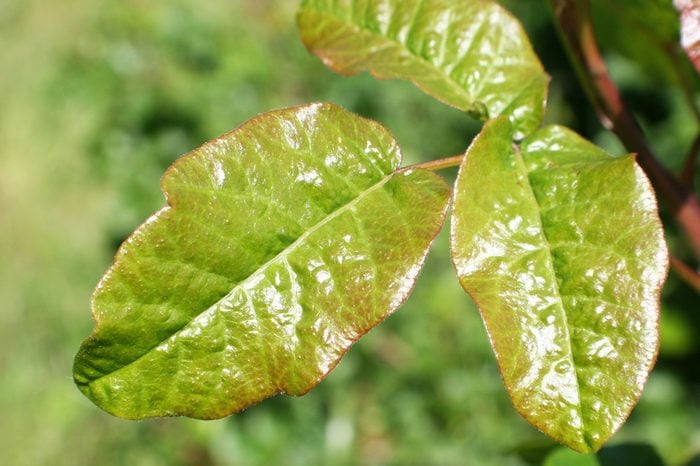
Poison ivy, oak, and sumac
Each of these rash-inducing skin irritants is acquired through contact with the plant itself—and all are common summer troublemakers. If you’ve been in contact with poison ivy, oak, or sumac, wash the entire affected area well. “Some people require topical steroids to help with the itching and sometimes blisters, but oatmeal baths help too,” says Dyan Hes, MD, Medical Director of Gramercy Pediatrics in New York City. If the itching and swelling become severe, she suggests contacting your physician immediately. (Here are home remedies for poison ivy.)

Traffic accidents
Spending time outdoors and travelling more frequently may be less common this summer, but you still have to be wary of car accidents. There are spikes in traffic fatalities around the winter holidays like Christmas and New Year’s Eve, but summer holidays like Victoria Day, Canada Day, and Labour Day are also some of the most dangerous days of the year for Canadians on the road. “Be sure to wear your seatbelt and avoid texting while driving, as well as driving under the influence,” says Dr. Morland.
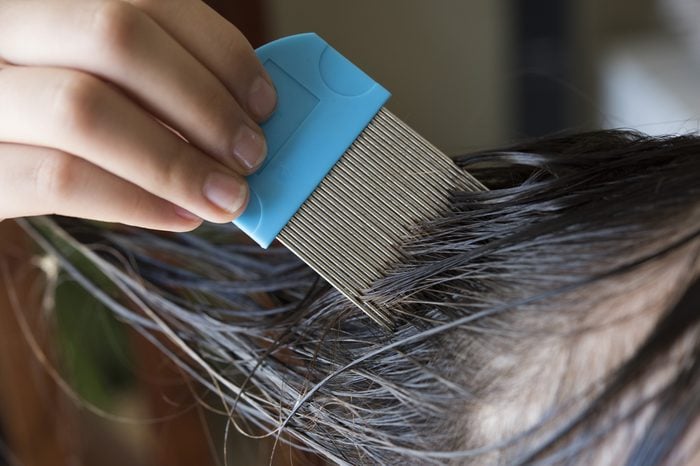
Lice
Especially if you have young children, you’ll want to be aware of lice, which are rampant at summer camps. Dr. Hes recommends teaching your child not to share hats, combs, or brushes with his or her peers. “When your child gets home each day, check for nits (lice eggs) behind the ears and at the base of the hairline behind the neck, as these are the locations where lice tend to congregate,” she says.
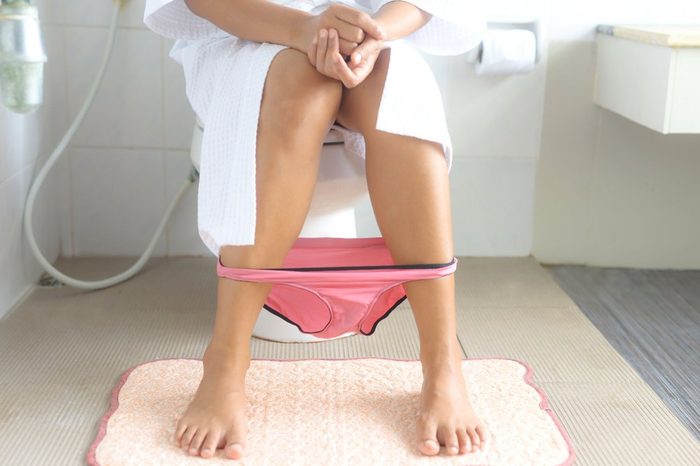
UTIs
Many women, especially young girls, develop vaginal itching over the summer, often caused by yeast, according to Dr. Hes. “This is usually from wearing tight clothing and sweating or running around in a wet bathing suit for hours,” she says. “Teach your daughter to change out of a wet bathing suit when swimming is over and dress your child in loose, cotton underwear and breathable clothing.” If your child is complaining of vaginal itching, she suggests contacting your health care provider for an examination, as a prescription cream might be required for treatment. (Here are the UTI symptoms you need to know.)
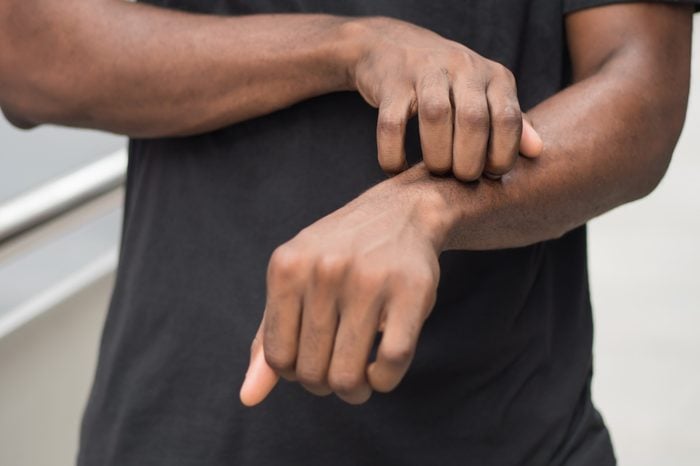
Heat rash
If you exercise or work outside during summer months, you’re at a greater risk for heat rash. “This happens when the sweat glands in the skin are blocked and the moisture can’t get to the surface of the skin to evaporate,” says dermatologist Joel Schlessinger, MD. “You’ll notice a red rash and an itchy or prickly feeling on the surface of the skin.” To prevent heat rash, he recommends wearing loose clothing when you’re out in the heat, taking frequent breaks in cool, indoor locations, and using a talc-based powder, to absorb excess sweat and prevent irritation and chafing.
Next, learn the ways to take care of your mental health this summer.
